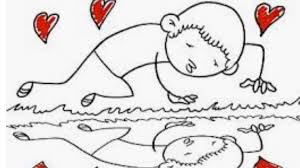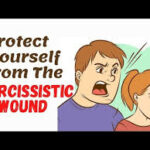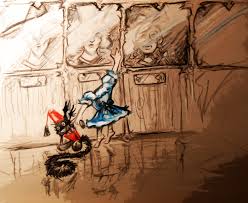This blog post will go in-depth into all aspects of what a narcissistic injury is, how a narcissistic injury feels like, what are the signs that you are dealing with narcissistic wound, how to identify if someone has one, coping with these types of wounds, and finally what are the therapies for curing them!
Contents
- 1 What Is Narcissistic Injury?
- 2 How Does It Feel To Suffer From A Narcissistic Injury?
- 3 What Are The Causes Of Narcissistic Injury?
- 4 How To Identify If You Are Dealing With A Narcissistic Injury?
- 5 How To Cope With A Narcissistic Injury?
- 6 What Are Therapies To Cure The Narcissistic Injury?
- 7 Conclusion
What Is Narcissistic Injury?

A narcissistic injury is an act or event that is perceived by the narcissist to be a threat to their self-esteem, integrity, and stability. It can also be when someone does something or says something against them in some way which they perceive a less than ideal.
Their feelings of inferiority are made known through what we call “narcissistic rage.” When they experience a narcissistic injury, it’s usually about the inability to maintain their grandiose self.
What Is Narcissist?
A narcissist can be perceived as someone who is selfish and egotistical or sometimes just difficult to handle. However, this isn’t always the case! A person with NPD (Narcissistic Personality Disorder) suffers from a mental disorder in which they have an inflated sense of self-importance, need for admiration, and lack of empathy for others.
Who Gave The Term Narcissistic Injury?
The term “narcissistic injury” was first coined by psychoanalyst Heinz Kohut in the 1970s. He described it as a wound to the self-esteem that is inflicted either by others or oneself.
How Does It Feel To Suffer From A Narcissistic Injury?
When you suffer from a narcissistic injury, it feels like someone has ripped your heart out. You feel helpless and alone with the immense amount of pain that you are experiencing. It can feel like your mind is racing with thoughts, making it difficult to think clearly.
What Are The Causes Of Narcissistic Injury?
Several things can cause someone to experience a narcissistic injury. These include:
Being Criticized
A person with NPD is very sensitive and it’s easy for them to feel hurt from criticism. Even if the other person does not intend for this! This can be seen as defensiveness or withdrawal on their part.
Being Neglected Or Ignored
When someone is neglected or ignored by those close to them, it can feel like a verbal slap in the face. This may cause anger and encourage lashing out on their part as well as an attempt to regain control over that person.
Feeling Unappreciated And Undervalued By Others
Feeling unappreciated and undervalued by others can be very painful for someone with NPD. It’s common to see them becoming defensive or withdrawing when this happens as they feel like their entire sense of self is threatened!
Being Rejected By Others
When a person rejects another, it can make them feel like there must be something wrong with them. This can be especially true if they are trying to form a relationship with that person. It can be very difficult for someone with NPD to cope with rejection.
Furthermore

- Having someone show more interest in others than themselves
- Someone envying them for something they have done
- Being betrayed or lied to by someone they trusted
- Someone taking their ideas and not giving them credit for it
- Having a family member dying (even if the narcissist is already dead themselves)
How To Identify If You Are Dealing With A Narcissistic Injury?
There are many signs and symptoms which indicate someone may be dealing with a narcissistic injury. However, there are five main ones which you should look out for.
Becoming Defensive
When someone starts to lash out at others or becomes very defensive about their position in life and the people around them. They may also feel a need to prove themselves constantly, sometimes even resorting to violence.
Possessiveness
Another symptom can be seen through possessiveness over certain things which they perceive as being “theirs.” This can be anything from relationships to material possessions.
Withdrawal
When someone withdraws from friends and family. Often retreating into their world where they feel safe. This can manifest itself through social media addiction or excessive sleeping.
Extreme Mood Swings
When someone experiences a drastic change in their mood or behavior which is out of character for them. This could include becoming depressed, suicidal, or manic.
Controlling Tendencies
When someone feels the need to have complete control of a situation or people, often become demanding about it. They may become irritable and impatient if they don’t get what they want.
Feeling Inferior Or Superior To Others
A person can feel either inferior or superior to others at different times in their life. For example, when someone is in a depressive state, they may feel inferior due to thinking that no one could ever love them. However, when feeling more confident, someone can become very superior and demanding of others.
How To Cope With A Narcissistic Injury?

If you are experiencing a narcissistic injury, it is important to seek professional help. This can be done through therapy or medication.
However, there are some things that you can do in the meantime to try and help cope with the pain. Here is the list of things that you can try and see if that helps:
Talk To Someone You Trust
Talking about how you’re feeling with someone who understands and will listen is a great way to start the healing process. It can be difficult to do, but it’s a good step in the right direction.
Express Your Feelings
Another thing that can help is writing down your thoughts and feelings in a journal. This will allow you to release all of the anger, sadness, and frustration that you are feeling.
Do Something You Enjoy
Finally, do something that you enjoy. This can be anything from reading a book to going for a walk in nature. It’s important to take some time for yourself and focus on doing things that make you happy.
Some self-care tips
- Spending time outdoors in nature,
- Practicing meditation or mindfulness,
- Expressing your feelings through artwork or creative endeavors,
- Listening to calming music, and exercising
What Are Therapies To Cure The Narcissistic Injury?
Many different therapies exist to cure narcissistic injury. Some of these include:
Psychotherapy
This is a type of talking therapy in which you can express your feelings and emotions with someone who isn’t emotionally involved with them (unlike friends or family). You can also work with them to identify destructive patterns of behavior and thought.
Family Therapy
This is for those who are experiencing problems in their sibling, parent/child, or marital relationships. It can be very helpful to have a neutral person guide you through the process which helps resolve any conflicts you may be having.
Group Therapy
This is a form of therapy in which you meet with other people who are also struggling with similar problems. This can be very beneficial as it provides a sense of understanding and support from those who understand what you’re going through.
Cognitive Behavioral Therapy (CBT)
This type of therapy helps you to change the negative thoughts and beliefs which contribute to your problems. It can be very effective in helping you to manage difficult emotions. As it focuses on changing the way you think and behave.
- It can be very helpful in managing difficult emotions and improving relationships.
Dialectical Behavioral Therapy (DBT)
This type of therapy helps you to learn how to regulate your emotions, tolerate distress, and effectively manage relationships. This can be done by learning new skills and practicing them in a safe environment.
Conclusion
If you are looking for affordable Online Counseling MantraCare can help: Book a trial therapy session


